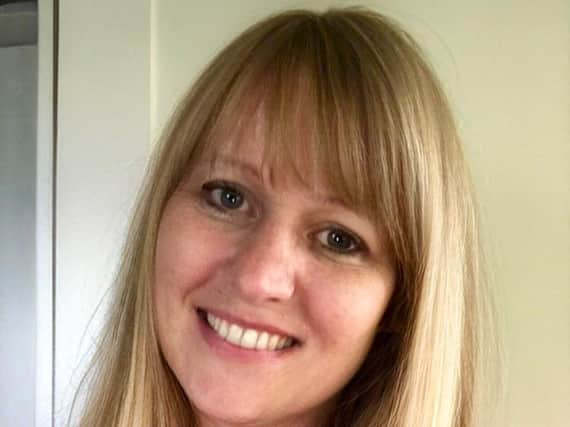'My life with Tourette Syndrome' - Daventry mother shares her experience of living with the condition


But it wasn't until she was watching TV many years later, the truth came to light.
Kat, a 39-year-old mum of three who is a psychology lecturer and child therapist, said: "I was diagnosed aged 27 after I watched a TV programme following the lives of Tourette’s sufferers and it was a lightbulb moment. I thought 'oh my gosh, that’s me!'
Advertisement
Hide AdAdvertisement
Hide Ad"I can remember having tics from around the age of eight but they were fairly mild from the outside and didn’t at all fit with the Tourette’s stereotype. I don’t swear, or jump, or shout. The swearing tic is something that gets the most attention but it is actually only around 10% of people with Tourette’s that have this type of tic.
She said diagnosis was 'somewhat of an anti-climax'.
"I imagined it to be a turning point, and I suppose it was in terms of me making sense of my experience so far," added Kat.
"What I did not anticipate was the new level of frustration from the lack of support and understanding available to me. I had an expectation that it would open doors to help me learn about my condition, that I would be offered support to manage things but, I was discharged.
"If there were something I could impart to Daventry Express readers about Tourette Syndrome it would be that it is so very subjective. I read a journal once where the author described that the only consistent thing about Tourette’s was its inconsistency, and that resonated with me. I think it’s this inconsistency that creates so much confusion around the condition. Some people can supress their tics for a time, other can’t."
Advertisement
Hide AdAdvertisement
Hide AdShe said tics come and go and she may have a particular motor tic one month which can be replaced with something else the following month.
Kat added: "They ‘wax and wane’, and there is no rhyme or reason to this, you kind of just have to go with it. And that’s hard, you feel at times like your fighting with your own body. I don’t want to do these movements or make these noises but they are completely involuntary, and while I personally am able to supress them for a time I can still feel them."
But there's so much more to the condition than just tics.
"I often use the sneeze analogy when I try to explain to explain my experience," said Kat.
"It’s a sensation in your body, officially it's termed the ‘premonitory urge’ but it’s essentially a physical sensation in your body that builds and builds, until it can be released. It’s this invisible element that is hard to explain and for me personally causes a lot of distress because it is a feeling of constant discomfort in my body, and it’s exhausting.
Advertisement
Hide AdAdvertisement
Hide Ad"Suppression is also exhausting and as I said, not everyone with TS can supress their tics. Sometimes I don’t know if that’s a positive or a negative. I suppose suppression means I am able to reduce the possible ridicule and rejection I might experience from people around me, but it’s a double-edged sword because it means I am silently walking around with the most awful conflict going on within myself. I am constantly on edge and as a result I have experienced some awful bouts of anxiety and depression over the years."
Kat says she hopes people will gain insight from learning about her experience with TS.
"Disclosure is hard but I am hoping that by sharing my experience, it will give people a little insight into life with Tourette’s Syndrome," she said.
"Awareness breeds empathy and it is estimated that one in 100 children in the UK currently have a Tourette Syndrome diagnosis, and there are likely a lot more undiagnosed because of the lack of understanding around the condition. Healthcare providers, in my experience, have minimal knowledge of the wide impact TS can have and young people are often left unsupported during a pretty critical time in their lives. There is no NICE guideline, so no standard of care that healthcare providers are guided by or need to adhere to. Imagine the message that gives to newly diagnosed children and their families."
Advertisement
Hide AdAdvertisement
Hide AdShe said often, a young person will receive a diagnosis by mail with no follow-up in terms of support.
"There are only a handful of Tourette’s specialist centres within the country, some will not take out of area referrals and the ones that will are inundated and are under pressure to reduce waiting times, so therefore are declined referrals," she added.
"Usually at the point when someone is referred to a specialist centre, they have exhausted all other means - local services cannot help them, so to then also be rejected by the specialist centre is a hard blow.
"Lots of children are currently struggling to get a diagnosis and any ongoing medical support due to the lack of services. Diagnosis leads to awareness and understanding, so without this the child and family really struggles."
Advertisement
Hide AdAdvertisement
Hide AdThe following petition has been set up by a mum who is trying to improve medical services: https://petition.parliament.uk/petitions/575370
Kat is appealing for people to support the petition.
She said: "We desperately need to get to 100,000 signatures so that we get a debate in Parliament."
There's no cure for Tourette Syndrome and most children with tics do not need treatment for them.
Treatment can involve behavioural therapy/medicine.
There is no cure for the condition.
Have you got a health condition you'd like to share with us? Please email [email protected]